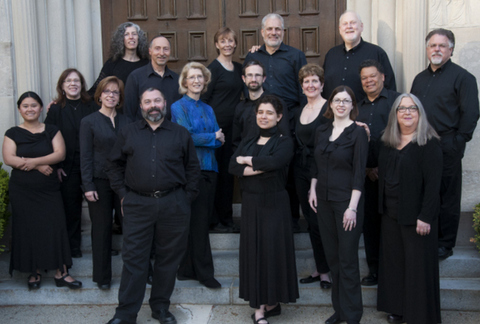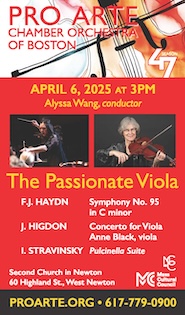Seraphim Singers wrap 21st season with music from peace to partying

Directed by Jennifer Lester (in blue) the Seraphim Singers performed Saturday night at Eliot Church in Newton.
Seraphim Singers closed their twenty-first season Saturday night at Newton’s Eliot Church. Their program, led by music director Jennifer Lester, combined themes of peace with, of all things, numerology. Reflecting their season, the numbers three, seven, and twenty-one figured prominently.
There were, for instance, three settings of Gerard Manley Hopkins’ poem “Peace” heard across the evening. A meditation on the fleeting presence of that fleeting phenomenon in our world, the poem brought forth strikingly different adaptations from composers Mark Kilstofte, Carlyle Sharpe, and Edie Hill.
Kilstofte’s score emphasized the searching nature of Hopkins’ verse, with canonic melodies and poignant suspensions culminating in an ambiguous, half-cadence-like ending: peace just out of reach.
Righteous anger marked Sharpe’s essay. In it, thick chordal textures, episodes of dissonant homophony, and a series of strident climaxes suggested violent frustration waiting for peace to arrive.
Hill’s “Wild Wooddove” combined elements of the other two settings, alternating a leaping motive representing the titular avian with pungent text paintings.
Saturday’s performances of all three works were directed and intense. The Kilstofte’s climaxes were rich and well-balanced, while Sharpe’s setting was marked by warm-toned singing and discreet attention to dynamics. The Singers’ account of the agile wooddove motive in the Hill was likewise securely etched.
A further trilogy of motets anchored the night’s offerings.
Three pieces by Heinrich Schütz – “So fahr ich hin zu Jesu Christ,” “Selig sind die Toten,” and “Verleih uns Frieden genädiglich” – didn’t offer much contrast by way of tempo, texture, or mood. But they did provide the Singers room to showcase their command of textural balances and understanding of these works’ dance-like inspiration. Also, the grand, closing phrases of the final pair were sung with noble heft.
J. S. Bach’s “Der Geist hilft unser Schwachheit auf,” a two-part motet for chorus and organ, was big-boned and energetic in the opening chorus, and nicely focused in its concluding chorale.
The choir’s diction was occasionally indistinct in the latter’s contrapuntal passages, as it was in parts of Hugo Distler’s “Singet dem Herrn ein neues Lied.” Yet the ensemble made impressive work of the score’s vigorously syncopated rhythms, attacking them with gusto while articulating Distler’s chromatic tonality with plenty of confidence.
Jonathan Dove’s “Seek him that maketh the seven stars” and Carson Cooman’s “Veni Sancte Spiritus” emphasized the number seven.
The Dove sets biblical verses about the heavens lighting the darkness. In it, organ arpeggios suggest the starry firmament, while long melodic lines rise from the choir. Sometimes the latter are combined contrapuntally, sometimes they’re interspersed with diatonic refrains.
Dove’s writing throughout is genial and accessible, occasionally echoing the style of Philip Glass and the sonorities of Gustav Holst to an uncomfortable degree. But the piece is thoughtfully shaped and was sung with an inviting blend of tender feeling and biting rhythms.
Cooman’s strongly tuneful contribution mixed techniques drawn from Renaissance composers with a harmonic language and syntax that’s generally more tonal than modal. The delicately glowing central verses, scored for men’s voices alone, came across with alluring beauty.
Rounding out the night’s choral contributions (and celebrating the Singers’ “coming of age” season) were a pair of drinking songs.
The Seraphim women sang David Mooney’s arrangement of “Quick! we have but a second” with a good deal of energy. Meanwhile, some unclear diction and erratic tuning aside, the men made stout work of Franz Schubert’s folk-like “Wein und Liebe.”
Organist Heinrich Christensen accompanied the Singers in just three of the program’s eleven pieces. But he made the most of his solo turn, providing a shapely, vital account of Bach’s grand, E-flat major “St. Anne” Fugue during the concert’s second half.
Posted in Performances

